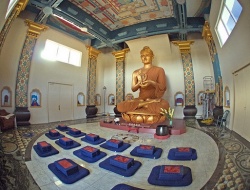Self
We might say that there are two types of self – the empirical self (atta paṭilābhā) and the metaphysical self. The empirical self is the self as the individual experiences it – his or her thoughts and feelings, traits and dispositions, and the feeling of being autonomous and separate from others.
This self clearly exists, although it is constantly changing and evolving. The metaphysical self is believed to be an unchanging substrata which is the essence of the individual. In some traditions it is called the spirit or the soul.
At the time of the Buddha, the Upaniṣadic sages were beginning to develop the idea that the goal of the religious life was to merge the metaphysical self (ātman) with the World Self (Brahman),
or to see that the first is actually the same as the second. The Buddha realized that in fact the concept of the metaphysical self is the result of faulty speculation about the empirical self driven by fear of death, desire for pleasure and longing for eternity.
In short, it is a more refined version of the selfishness, conceit, narcissism and self-promotion that are so much a part of ordinary life.
For the Buddha, freedom and lasting happiness comes from seeing the truth of anattā,that there is no metaphysical self.
In the famous Anattalakkhaṇa Sutta he says: ‘Body is not the self, feelings, perceptions, mental constructs and consciousness are not the self, for if they were they would not be impermanent and you could say to your body, feelings, etc,
“Be like this. Don’t be like that.” But since body, feelings, perceptions, mental constructs and consciousness are impermanent and you cannot say to them “Be like this. Don’t be like that” they are not self ....
When a well-instructed disciple sees this there is a turning away from the body, feelings, etc., turning away from them the passions fade, when the passions fade he is free and when he is free he knows he is free. He knows that rebirth is stopped, the holy life has been lived, he has done what has to be done and there is no more hereafter.’ (S.III,59).
Selfless Persons, Steven Collins, 1985.
